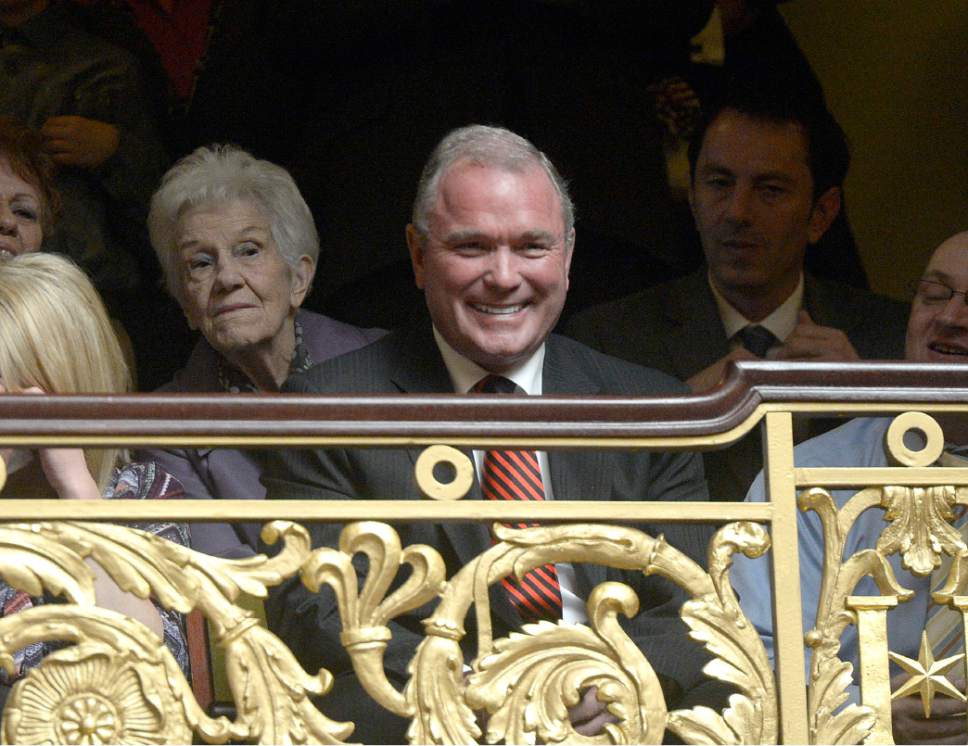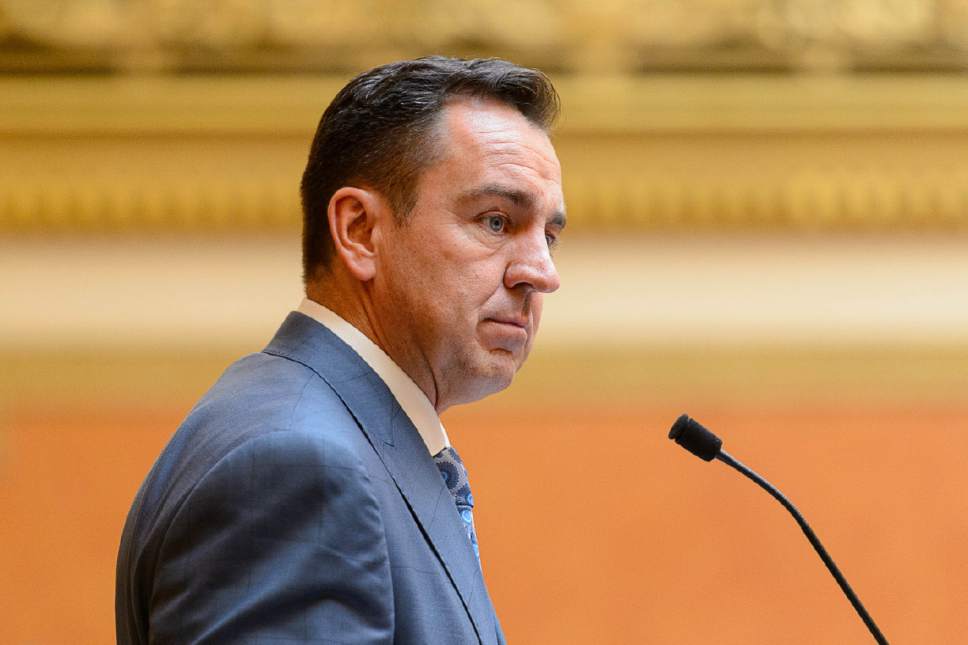This is an archived article that was published on sltrib.com in 2017, and information in the article may be outdated. It is provided only for personal research purposes and may not be reprinted.
Utah House Speaker Greg Hughes wasn't called to testify in the criminal trial of John Swallow, as originally planned, after a key witness thrust his name into the case with allegations of a secret meeting at a posh California resort and payoffs during Hughes' time on the Utah Transit Authority board.
The accusations revived questions about a controversy-laden development planned around a Draper train station. An FBI agent who did testify at the trial — which could go to the jury Wednesday — said the federal agency has an ongoing criminal investigation involving the mixed-use project.
Now, a court document shows Hughes, R-Draper, also was subpoenaed in late 2016 in a business lawsuit between others regarding the development.
Court papers say the subpoena was filed to find out whether developer Terry Diehl, another former UTA board member, promised Hughes a piece of the Draper project or whether documents exist showing any payment to Hughes or family members from Diehl or affiliated entities.
The Salt Lake Tribune came across the subpoena documents in a search after prosecution witness Marc Sessions Jenson raised allegations in the Swallow case.
Hughes vigorously denies that he received any part of that project or related payments, or that he attended any secret UTA meeting in California.
The renewed attention on the old controversy comes at an inopportune time for Hughes politically. He is not only presiding over the always-frantic waning days of the annual legislative session, but also reportedly being considered for a transportation-related post in the administration of President Donald Trump.
Hughes was subpoenaed Nov. 4 as part of a lawsuit brought against Diehl by Bodell Construction, a company owned by developer Michael Bodell.
In the lawsuit, Bodell alleges that $8.5 million from the sale of land by the Draper FrontRunner station was supposed to go to a company he and Diehl owned and then divvied up between them. It asserts that Diehl instead steered the money to Skyline Venture Associates, owned by Diehl's daughters.
Peter Stirba, a Salt Lake City attorney representing Diehl and Hughes, objected to the subpoena sent to Hughes. The lawyer argued that the subpoena was overly broad and that "Mr. Hughes has absolutely no relation to the subject matter of the lawsuit, and there is no indication how any of his testimony or any of the requested documents, should any exist in his custody or control, are relevant to this matter or within the scope of [evidence] discovery."
Bodell's attorney James Magleby shot back in court papers, saying he was seeking information on Diehl's handwritten "pro forma" notes from Jan. 9, 2009, "indicating amounts owed to 'Greg Hughes,' 'Hughes' and 'Hughes CDA,' in what appear to be amounts '350,000,' '320' and '180,' respectively."
Stirba, who has been speaking for Hughes and Diehl in the matter, did not respond on the record to repeated requests for comment. He did send a letter to The Tribune's editor, requesting that this story not be published. In his letter, Stirba provided Diehl's explanation that "Speaker Hughes did not know about the handwritten notes, received no money from the Draper project and had nothing to do with it." Stirba also stated Diehl's assertion that the notes were "created in anticipation of a real estate transaction that never occurred."
Magleby declined to comment. Court papers regarding his subpoena said Bodell wanted to "discover whether Mr. Hughes was also promised a piece of the Draper project by Diehl and/or whether Mr. Hughes had any involvement in, or knowledge of, the alleged 'partnership' " between Diehl and a company owned by businessman Mark Robbins, the court document states.
A Dec. 13, 2016, court-docket entry shows that Hughes objected to the subpoena and then asked to keep his motion secret. The court docket also shows Hughes' name attached to 50 entries. More than half (32) have been classified as private and are unavailable to the public. Most of the 18 docket entries that are open only contain the judge's orders sealing other documents.
The subpoena papers that refer to the handwritten document were supposed to be sealed but were not until recently, when The Tribune inquired about them with Stirba.
In a Jan. 30, 2016, decision about the objections to the subpoena, 3rd District Judge Todd Shaughnessy ruled that Hughes would have to either submit a sworn statement confirming that he doesn't have evidence relevant to the case, or sit for a deposition. There was no indication as of Tuesday in the court record what Hughes has done.
Jenson, a formerly imprisoned businessman, recently testified at Swallow's trial that Hughes had attended a secret meeting in early June 2009 at Southern California's Pelican Hill resort that included Swallow; former three-term Attorney General Mark Shurtleff; Shurtleff's friend and so-called "fixer," the late Timothy Lawson; Robbins and other UTA officials.
Jenson alleged under oath that UTA board members received money from the Draper station development, then known as Whitewater VII.
Testifying on Thursday in the Swallow trial, FBI Special Agent Jon Isakson was asked about Hughes. The agent acknowledged that the FBI has a separate ongoing investigation of Whitewater VII. The development also has been the subject of two legislative audits and a Utah attorney general's office investigation, which was turned over to the FBI.
Isakson said agents have not interviewed Hughes because the question of whether he was at Pelican Hill was not relevant to the Swallow case.
Hughes provided The Tribune last month with a broad glimpse of his calendar for those days in June 2009. It included church meetings, a social media post of him at home with his son, a radio appearance and meetings at the Utah Capitol and with Canyons School District.
He was poised to testify to rebut Jenson's allegations, but Swallow's defense team dropped him from the witness list last week.
"We feel the FBI has essentially accepted Mr. Hughes' public explanation, and therefore the FBI must believe Mr. Hughes rather than the claims of Marc Jenson," Swallow attorney Scott C. Williams said. "We do not wish to burden [the speaker's] final days at the Legislature with uncertainty about whether or not he will have to testify."





